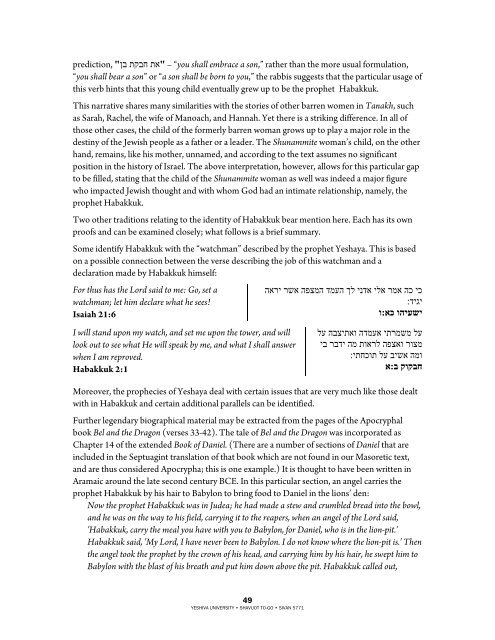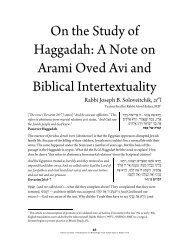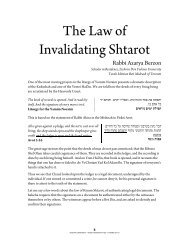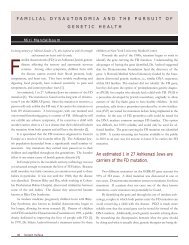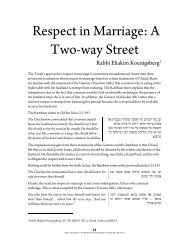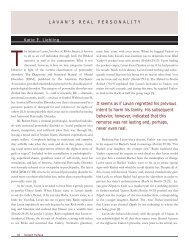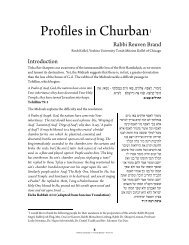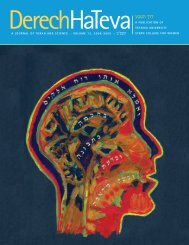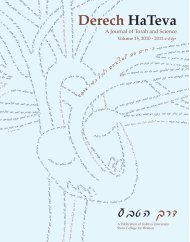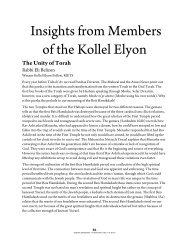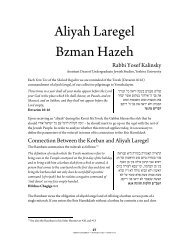Create successful ePaper yourself
Turn your PDF publications into a flip-book with our unique Google optimized e-Paper software.
prediction, " ןב תקבח תא"<br />
– “you shall embrace a son,” rather than the more usual formulation,<br />
“you shall bear a son” or “a son shall be born to you,” the rabbis suggests that the particular usage of<br />
this verb hints that this young child eventually grew up to be the prophet Habakkuk.<br />
This narrative shares many similarities with the stories of other barren women in Tanakh, such<br />
as Sarah, Rachel, the wife of Manoach, and Hannah. Yet there is a striking difference. In all of<br />
those other cases, the child of the formerly barren woman grows up to play a major role in the<br />
destiny of the Jewish people as a father or a leader. The Shunammite woman’s child, on the other<br />
hand, remains, like his mother, unnamed, and according to the text assumes no significant<br />
position in the history of Israel. The above interpretation, however, allows for this particular gap<br />
to be filled, stating that the child of the Shunammite woman as well was indeed a major figure<br />
who impacted Jewish thought and with whom God had an intimate relationship, namely, the<br />
prophet Habakkuk.<br />
Two other traditions relating to the identity of Habakkuk bear mention here. Each has its own<br />
proofs and can be examined closely; what follows is a brief summary.<br />
Some identify Habakkuk with the “watchman” described by the prophet Yeshaya. This is based<br />
on a possible connection between the verse describing the job of this watchman and a<br />
declaration made by Habakkuk himself:<br />
For thus has the Lord said to me: Go, set a<br />
watchman; let him declare what he sees!<br />
Isaiah 21:6<br />
I will stand upon my watch, and set me upon the tower, and will<br />
look out to see what He will speak by me, and what I shall answer<br />
when I am reproved.<br />
Habakkuk 2:1<br />
49<br />
YESHIVA UNIVERSITY • SHAVUOT TO-GO • SIVAN 5771<br />
הארי רשא הפצמה דמעה ךל ינדא ילא רמא הכ יכ<br />
: דיגי<br />
ו:<br />
אכ והיעשי<br />
לע הבציתאו הדמעא יתרמשמ לע<br />
יב רבדי המ תוארל הפצאו רוצמ<br />
: יתחכות לע בישא המו<br />
א:<br />
ב קוקבח<br />
Moreover, the prophecies of Yeshaya deal with certain issues that are very much like those dealt<br />
with in Habakkuk and certain additional parallels can be identified.<br />
Further legendary biographical material may be extracted from the pages of the Apocryphal<br />
book Bel and the Dragon (verses 33-42). The tale of Bel and the Dragon was incorporated as<br />
Chapter 14 of the extended Book of Daniel. (There are a number of sections of Daniel that are<br />
included in the Septuagint translation of that book which are not found in our Masoretic text,<br />
and are thus considered Apocrypha; this is one example.) It is thought to have been written in<br />
Aramaic around the late second century BCE. In this particular section, an angel carries the<br />
prophet Habakkuk by his hair to Babylon to bring food to Daniel in the lions’ den:<br />
Now the prophet Habakkuk was in Judea; he had made a stew and crumbled bread into the bowl,<br />
and he was on the way to his field, carrying it to the reapers, when an angel of the Lord said,<br />
'Habakkuk, carry the meal you have with you to Babylon, for Daniel, who is in the lion-pit.'<br />
Habakkuk said, 'My Lord, I have never been to Babylon. I do not know where the lion-pit is.' Then<br />
the angel took the prophet by the crown of his head, and carrying him by his hair, he swept him to<br />
Babylon with the blast of his breath and put him down above the pit. Habakkuk called out,


